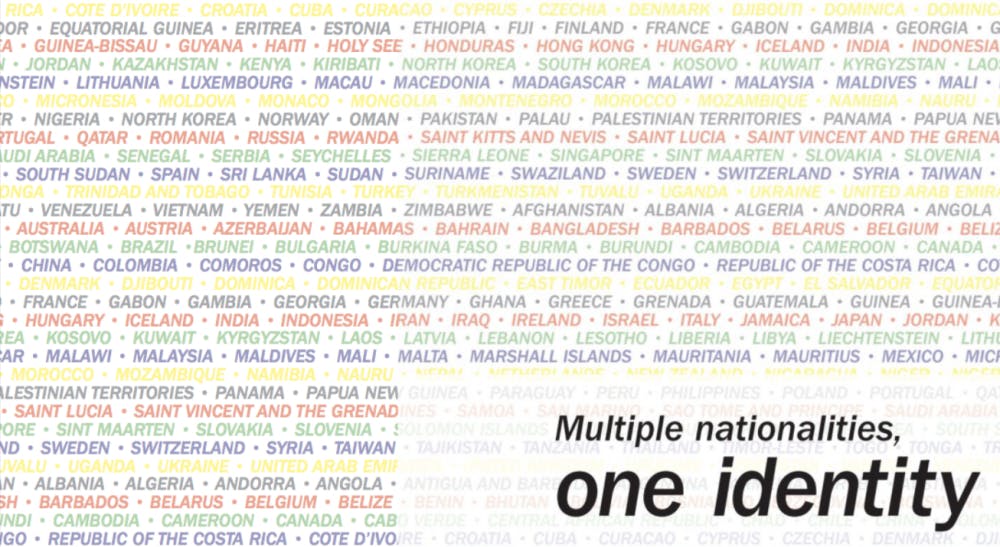The age old ice breaker, ‘say your name and an interesting fact about yourself’ can be a struggle for some, but for Anna Atkinson, she’s always known her special something.
Growing up, whenever it was Anna’s turn to tell her distinguishing trait, she would always say, “My name’s Anna, my dad’s from England and I have dual citizenship!”
As a now IU junior, being a citizen in England and the United States is more than just a fun fact about Anna, it’s become an integral part of who she is.
It was the little things throughout her childhood that made differences along the way. Anna emphasizes that her father worked hard to ensure that although she lived nearly 4,000 miles away from England, the culture of his homeland lived on.
While she enjoyed the perks of British culture like teatime and a feast of lamb and potatoes for Easter, there were also more serious aspects of her father’s heritage that remained present through Anna’s upbringing.
“Definitely the religious aspect of his upbringing, he has brought with him and shared it with my brother, my mom and me,” said Anna. “We’re Episcopalian, which is the Church of England. My mom was Catholic, and she kind of left that part of her life and joined the Episcopal Church to be with my dad.”
Anna describes the Episcopal Church as a liberal Catholicism. They differ in their stances on topics such as abortion, gay marriage and women priests.
While Anna is proud of her heritage, it’s on occasional family trips to England when she truly feels like she is embracing her identity as a dual citizen.
“It’s like a part of me I kind of suppress when I’m here, and then I get to go there and really embrace the culture and feel like I’m a part of it,” said Anna. “I’m not fully British, but it feels like I’m living this part of my life that I never really got to live.”
While Anna grew up with the influence of one other place, Jake Williger experienced the aspects of three very different cultures.
Jake has citizenship in Israel from his father, citizenship in the U.S. from his mother, who was born in Puerto Rico. Jake was born in Chicago and grew up in Chesterton, Indiana. His diverse background filled his childhood with unique experiences.
“I think it has exposed me to a lot of things that most people that are from my area haven’t really experienced, because I came from an area [Chesterton] where not only was my family the only Jewish family in the entire city, but I was one of only five Hispanic families in that entire city too,” said Jake. “So that just gave me a different perspective and a different cultural upbringing.”
It hasn’t always been easy for him to feel completely comfortable when he is in Israel or Puerto Rico either.
“When you come from two completely different cultures, it’s hard not to feel like an outsider when you’re in one particular culture, because when I’m in Puerto Rico, they see me as a Jew and when I’m in Israel or around other Jews, they see me as Puerto Rican. That’s kind of rough, but at the same time there are a lot of people who instead kind of see it as a more diverse experience.”
Although at times he struggles with feeling completely welcomed in either place, it doesn’t stop him from embracing a strong attachment and identification in both places.
“It [dual citizenship] has given me a focal point I can attach to in terms of the militant conflict in Israel and the poverty levels in Puerto Rico,” says Jake. “There are things that as an American citizen, I’m not really experiencing, but as an Israeli citizen I can relate to because they’re my people, and they’re my brothers.”
Dual citizenship, however, isn’t always made possible by bloodlines. Martin Carroll was born in Guatemala but is also a citizen in the United States from his adoption at nine months old.
While as an IU sophomore studying vocal performance, Martin looks forward to visiting Guatemala within the next couple of years to learn more about his heritage. It’s his identity as a U.S. citizen that has heavily influenced his outlook on life.
“It [being a dual citizen] reminds me that I should always try to use as many opportunities as I can, because if I was never adopted I wouldn’t be here,” he said. “It’s pretty much a fact. There is no way I would have probably discovered that I love to sing and had those opportunities. I’d probably be already working, so it just reminds me that I need to live with a purpose. It makes me really appreciate what I have.”
Being a dual citizen goes beyond having influences from two or three places. Olimpia Rosenthal, IU Assistant Professor in the Department of Spanish & Portugese, states that being a dual citizen can simply lead to a more open mind.
“I think that having that exposure to different cultures, to different languages allows you to be much more tolerant or at least know the importance of having both,” said Olimpial. “I think that having more of a broader background about what cultures are and how different they can be gives you more insight when traveling.”
While there are countless benefits of having dual citizenship, Anna, Jake and Martin still face the struggle of finding a satisfying sense of equality in their devotion to both countries in which they’re citizens. However, the answer won’t be the same for every person, and aspects of different cultures do not have to live separately. Olimpia says that as dual citizens mature and begin to understand the influences of these places in their lives, differing cultural impacts can do more than coexist.
“I think you do start blending parts of both cultures and that forms your own identity.” Olimpia says.






